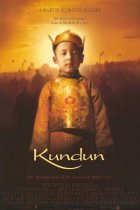
Kundun Page #6
- PG-13
- Year:
- 1997
- 134 min
- 1,175 Views
Tenzin Gyatso pulls away from the telescope. He waves to
the prisoners.
EXT. VALLEY OUTSIDE LHASA DAY (SUMMER, 1942)
The boy rides in his palanquin of yellow silk.
He is older now, seven or eight. He peers through the
curtain.
A grand procession carries the Dalai Lama from the Potala to
his summer residence, the Norbulinka.
Monks walk in procession, as do members of the aristocracy,
wearing their finest gowns and jewelry, holding their finest
parasols, and soldiers, wearing ancient uniforms. There are
horses, banners and carriages. Bodyguards carry the Dalai
Lama's possessions - wrapped in yellow silk. A band plays,
"God Save the King."
It is a magnificent display, and along the side of the road,
Tibetans prostrate in the presence of the boy, not daring to
look at him.
EXT. THE NORBULINKA DAY
Establishing shot of this lovely park.
Zt looks like a sweet, summer home compared to the looming
expansiveness of the Potala. It is filled with deer and
antelope, peacocks and nesting birds. An eccentric
collection of trees grow here - some indigenous, some
gifts - bearing flowers and fruit. There are fish ponds and
even a Kyichu river tributary nearby.
We find the young Dalai Lama standing by this tributary
daring to put one foot on a slippery, stepping stone. An
Attendant gently pulls him back.
Beyond the river, a herder leads a small group of braying
sheep towards town. The boy watches. He listens to the
herder's song.
EXT. GARDENS, NORBULINKA DAY
The Dalai Lama drops bits of food into a fish pond. He
calls the huge, lazy fish to come eat.
TENZIN GYATSO:
Little ones first, only
little ones.
The boy pushes the bigger ones away with a stick.
EXT. YELLOW WALL, NORBULINKA DAY
Tenzin Gyatso runs through an open gate in a mustard yellow
wall (which separates the Dalai Lama's residence from the
rest of the Norbulinka), and up the steps leading to a
white, one story, home - his parent's.
INT. PARENT'S HOME, NORBULINKA DAY
A startling, blue room.
The young Dalai Lama leans on the table where is Father sits
eating pork rinds.
Lobsang is there, practicing his writing on a chalk board.
Tenzin Gyatso grabs one pork rind, then another, then a
third.
LOBSANG SAMTEN:
The Dalai Lama is not supposed
to eat pork. It is not good for
your brain.
The Father uses the grease from the roasted lamb on the
table to caress his long mustache and twirl each side into a
point.
The Dalai Lama takes another, and then, suddenly, the boy
reaches up and for no reason, he pulls on his Father's
mustache, obviously hurting the man. The Father slaps the
boy's hand, hard.
The boy sits back, and begins drawing imaginary letters on
the tabletop with his slapped hand.
His Father reaches out and takes the hurt hand. He pulls
the boy into his arms.
FATHER:
I am sorry, Lhamo.
TENZIN GYATSO:
It is alright, Father.
The Master of the Robe knocks at the door. Father and son
look up.
MASTER OF THE ROBE
Kundun, you must come back now.
The young boy sits straight up on his Father's lap and says,
defiantly:
TENZIN GYATSO:
Go away.
The surprised Monk backs away from the door.
FATHER:
Not the way to talk to people.
TENZIN GYATSO:
Can I do anything I want?
FATHER:
No.
TENZIN GYATSO:
But, I am in charge.
FATHER:
Are you? Of whom?
The boy thinks.
TENZIN GYATSO:
Can I save the sheep from going
to the market? So they don't die.
LOBSANG:
You could buy them.
TENZIN GYATSO:
Do I have money?
LOBSANG:
What do you think?
TENZIN GYATSO:
Do you have money?
FATHER:
I do, now.
TENZIN GYATSO:
And you have horses?
You love horses.
FATHER:
I do, beautiful horses.
Thank you, Holiness.
TENZIN GYATSO:
Will you buy the sheep for me?
FATHER:
Where will you keep them?
TENZIN GYATSO:
Here. We'll collect them.
FATHER:
I will buy them for you.
TENZIN GYATSO:
Can I free the prisoners?
FATHER:
Hmmm.
LOBSANG:
You can't do anything real
until you are Dalai Lama.
TENZIN GYATSO:
I am him.
LOBSANG:
Not until you are eighteen.
MOTHER (OC)
You have escaped once more.
The Mother has been in the doorway, listening.
Tenzin Gyatso disengages from his Father's arms and goes to
his Mother. Tenzin reaches into one of her large, apron
pockets and finds nothing. Another. Nothing. He reaches
into her sash and pulls out a special-looking sweet. She
takes the boy's hand and leads him from the house.
LOBSANG:
Go study. I get in trouble if you
do not study.
Lobsang looks at his Father.
LOBSANG:
I do.
FATHER:
Sometimes you strike the goat,
to scare the sheep.
LOBSANG:
I am the goat.
He is a naughty sheep.
FATHER:
He will not be ours much longer.
CLOSE on the Father's face.
EXT. GARDENS, NORBULINKA DAY
The Mother walks the boy back to his residence, through the
gate in the yellow wall.
MOTHER:
I have news. The Regent
has resigned his post.
TENZIN GYATSO:
Is he a bad man? Norbu says
he is "lavish" and "willful".
"How can he give you monk's vows
if he has not kept them
himself?"
MOTHER:
Well, some say.
It's not for you to worry about.
Another will be chosen.
TENZIN GYATSO:
He was always nice to me.
He found me. He saw me in
his dreams.
EXT. DALAI LAMA'S RESIDENCE, NORBULINKA DAY
They have reached the residence. The boy's Mother caresses
his little head.
MOTHER:
I turn you over again, today,
Lhamo. One day, you will not
be able to come running to us.
TENZIN GYATSO:
But you will always be here?
MOTHER:
Me?
TENZIN GYATSO:
You will always!
MOTHER:
I have one more piece of
news. A baby is coming.
Tenzin grabs at her stomach and shrieks with laughter.
TENZIN GYATSO:
Oh, Mama! Who will it be?
The Mother places her hands on Tenzin Gyatso's.
MOTHER:
Oh, no! Who can it be?
A string of old monks, stand, waiting for the naughty boy.
INT. ENTRANCE HALL, DALAI LAMA'S RESIDENCE, NORBULINKA,
DAY:
The boy runs up the stairs and towards the old men, but he
stops and looks at a small cabinet standing, unobtrusively,
in a corner. Tenzin Gyatso goes to the cabinet and rattles
the locked door.
TENZIN GYATSO:
My teeth! My teeth are in here!
A monk takes the boy by the hand and leads him down a
hallway.
TENZIN GYATSO:
My old teeth!
INT. DALAI LAMA'S PRIVATE ROOMS, EVENING
A bell and a dorge are laid out on a small table. Tenzin
Gyatso sits in front of this table.
A monk is chanting in low, deep tones, in the background.
The Dalai Lama's teacher, TAKTRA RINPOCHE, sits on the
floor. (Being the teacher, Taktra Rinpoche sits slightly
higher than the Dalai Lama.) Taktra is an older man, in his
sixties. He is stern, solid, no-nonsense.
Taktra Rinpoche begins a prayer.
TAKTRA RINPOCHE:
"I take refuge in the three jewels,
The Buddha, the Dharma and
the Sangra."
But the boy leaps up from his table and goes to Taktra and
hangs around his neck, shouting:
TENZIN GYATSO:
You recite!
You recite!
Taktra gives the boy just the slightest of looks.
TAKTRA RINPOCHE:
"I take refuge in the three jewels,
The Buddha, the Dharma and the
Sangra."
Translation
Translate and read this script in other languages:
Select another language:
- - Select -
- 简体中文 (Chinese - Simplified)
- 繁體中文 (Chinese - Traditional)
- Español (Spanish)
- Esperanto (Esperanto)
- 日本語 (Japanese)
- Português (Portuguese)
- Deutsch (German)
- العربية (Arabic)
- Français (French)
- Русский (Russian)
- ಕನ್ನಡ (Kannada)
- 한국어 (Korean)
- עברית (Hebrew)
- Gaeilge (Irish)
- Українська (Ukrainian)
- اردو (Urdu)
- Magyar (Hungarian)
- मानक हिन्दी (Hindi)
- Indonesia (Indonesian)
- Italiano (Italian)
- தமிழ் (Tamil)
- Türkçe (Turkish)
- తెలుగు (Telugu)
- ภาษาไทย (Thai)
- Tiếng Việt (Vietnamese)
- Čeština (Czech)
- Polski (Polish)
- Bahasa Indonesia (Indonesian)
- Românește (Romanian)
- Nederlands (Dutch)
- Ελληνικά (Greek)
- Latinum (Latin)
- Svenska (Swedish)
- Dansk (Danish)
- Suomi (Finnish)
- فارسی (Persian)
- ייִדיש (Yiddish)
- հայերեն (Armenian)
- Norsk (Norwegian)
- English (English)
Citation
Use the citation below to add this screenplay to your bibliography:
Style:MLAChicagoAPA
"Kundun" Scripts.com. STANDS4 LLC, 2025. Web. 23 Feb. 2025. <https://www.scripts.com/script/kundun_890>.







Discuss this script with the community:
Report Comment
We're doing our best to make sure our content is useful, accurate and safe.
If by any chance you spot an inappropriate comment while navigating through our website please use this form to let us know, and we'll take care of it shortly.
Attachment
You need to be logged in to favorite.
Log In